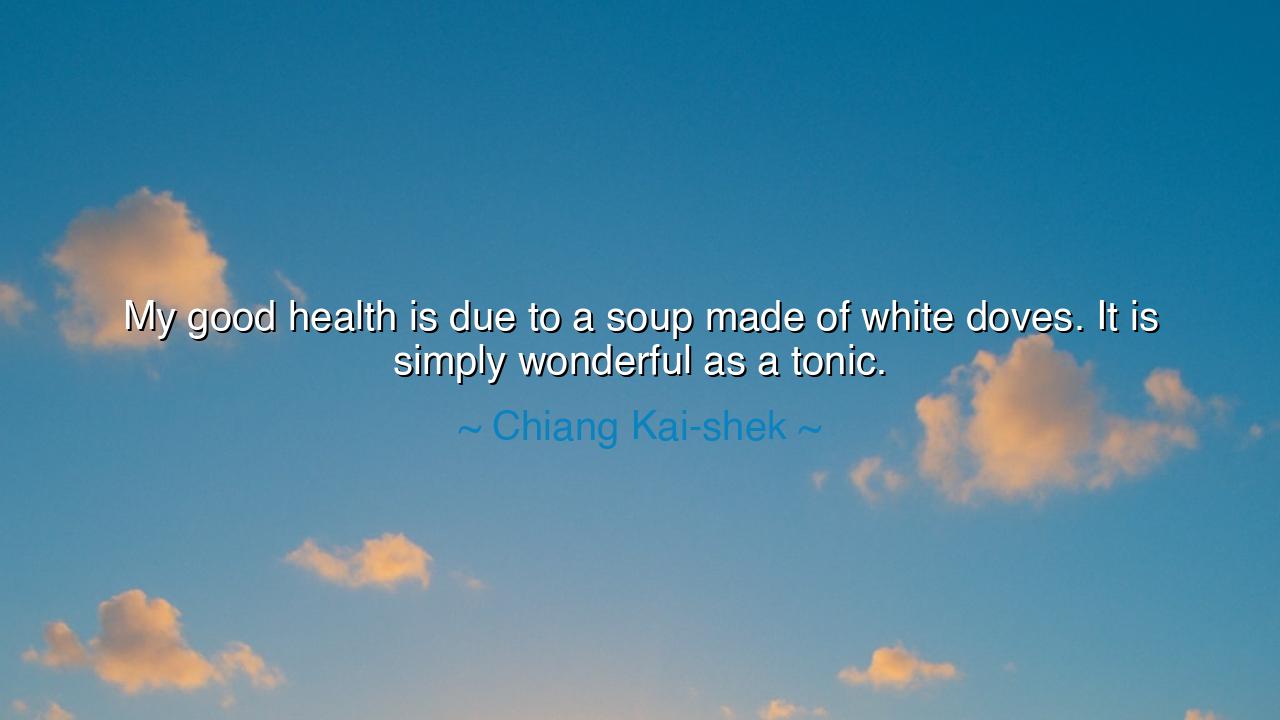
My good health is due to a soup made of white doves. It is simply
My good health is due to a soup made of white doves. It is simply wonderful as a tonic.






On the Nourishment of the Spirit: The Symbolic Wisdom of Chiang Kai-shek
Hear now the curious and reflective words of Chiang Kai-shek, who once declared: “My good health is due to a soup made of white doves. It is simply wonderful as a tonic.” At first, this seems but the comment of a man speaking of nourishment and bodily vigor. Yet, beneath these simple words lies the depth of a metaphor—the voice of a leader steeped in tradition, faith, and symbolism. For Chiang, the white dove was no mere bird of flesh; it was a symbol of purity, peace, and spiritual renewal. In this humble “soup,” he tasted not only strength for the body, but sustenance for the soul.
To understand the root of this saying, we must look to the world from which Chiang came—a world shaped by both the turbulence of war and the quiet wisdom of ancient Chinese philosophy. In that age, medicine was not divided between the physical and the spiritual. A tonic was not simply a cure for fatigue, but a ritual of balance—a way to align the forces of yin and yang, to restore harmony between the body’s essence and the universe’s rhythm. The white dove, long honored as a creature of purity and heavenly favor, embodied the peaceful energy of life itself. Thus, to partake of such a soup was to drink, symbolically, from the well of harmony and hope.
Chiang Kai-shek, though a soldier and ruler, was deeply religious, often turning to meditation and prayer during the storms of his reign. He saw the human body as a vessel through which the divine could work, and the preservation of health as a sacred duty to fulfill one’s purpose. In his long struggle to lead a nation torn between war and renewal, this belief became both literal and spiritual. The white dove soup he praised may have nourished his flesh, but the deeper nourishment came from what it represented—a renewal of purity amidst chaos, and the will to rise again after exhaustion.
Consider, then, the deeper lesson behind this imagery. Throughout history, those who bear heavy burdens must find their tonic, their quiet source of restoration. For some, it is food or rest; for others, it is prayer, art, or solitude. Alexander the Great found his renewal in the music of his homeland before battle; Emperor Ashoka, after years of conquest, found his health in compassion and peace. Chiang’s dove-soup, whether real or allegorical, teaches that even in power and turmoil, one must not neglect the inner fountain of peace that restores vitality. The true tonic, he suggests, is not found in ingredients, but in harmony between body, purpose, and spirit.
In a world that rushes endlessly toward progress, many forget this ancient truth. They seek health in medicine alone, but not in meaning; they heal the flesh, yet leave the spirit starved. They chase energy through labor, yet never through serenity. Chiang’s words whisper to us through time: that the purest health springs not from indulgence, but from balance—between effort and rest, between striving and surrender, between the warrior and the dove within.
The white dove also holds another lesson—the paradox of strength through gentleness. In many cultures, the dove is fragile, yet it endures; small, yet it carries messages of peace across battlefields. In this, Chiang perhaps saw his own struggle reflected: to remain calm amid war, to preserve purity amid corruption, to let gentleness guide the iron of leadership. Thus, his “tonic” becomes a metaphor for the soul of governance itself—the power that is both firm and kind, both disciplined and compassionate.
So, children of wisdom, take this teaching to heart: find your own soup of white doves—your own well of renewal that feeds both body and spirit. Do not seek health merely in the absence of illness, but in the presence of peace. Let your food, your thoughts, your rest all serve one sacred purpose: to make you whole. When the world grows heavy, return to simplicity, to purity, to calm. Drink deeply from the cup of balance, and you will find strength not only to live, but to lead. For as Chiang Kai-shek knew, true vitality is not in what we consume, but in what we cultivate within—the stillness of the dove amid the storm.






AAdministratorAdministrator
Welcome, honored guests. Please leave a comment, we will respond soon